#Planting And Pruning Grape Vines
Text
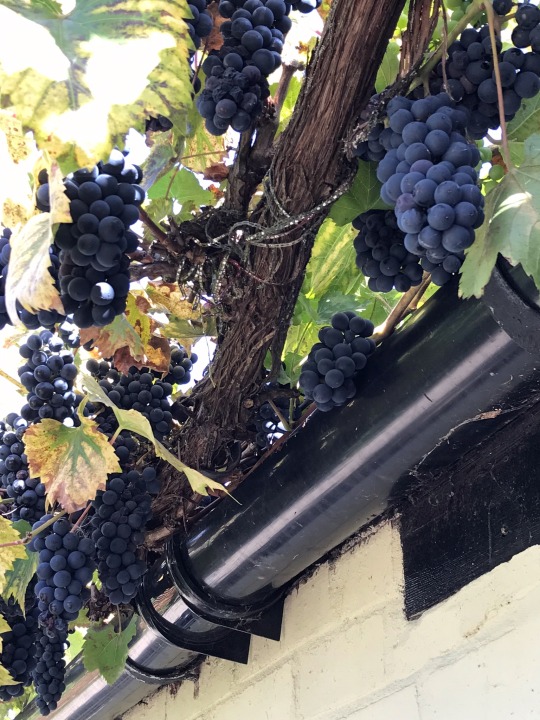
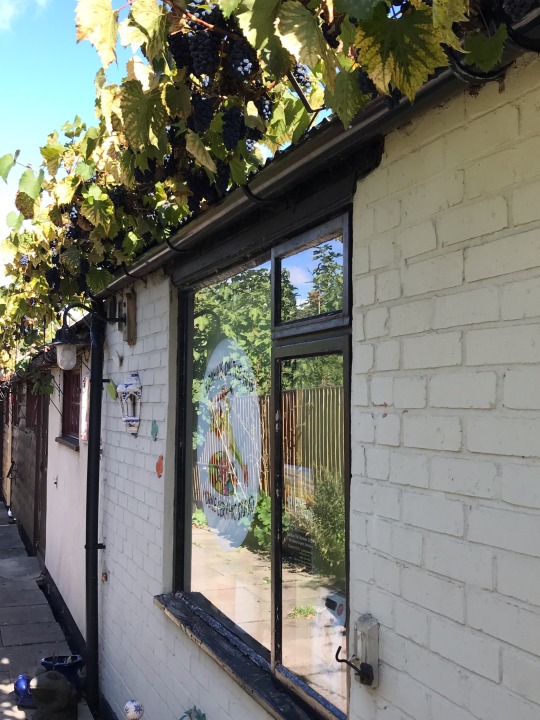
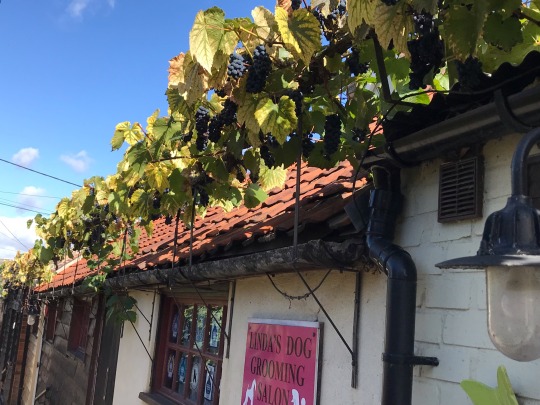
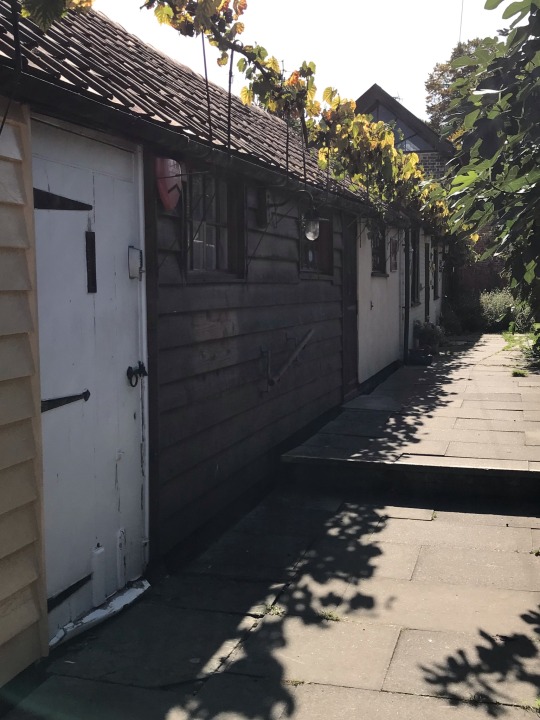
Plant of the Day
Friday 7 October 2022
This Vitis vinifera (grape) cultivar has been trained and pruned to grow along the roof line of this row of shop fronts. The summer growth of stems and foliage has been trimmed so that the bunches of grapes can ripen in the sunshine.
Jill Raggett
#vitis#grape#vine#climber#pruning#training#fruit#grapes#urbanplanting#plants#productivegarden#edibiles#gardens#writtledesign#horticulture#essex#writtle
142 notes
·
View notes
Text
The grapevine over our pergola.
I planted this when I built the pergola, about 27 years ago.
Safe to say it’s faring better than I am!
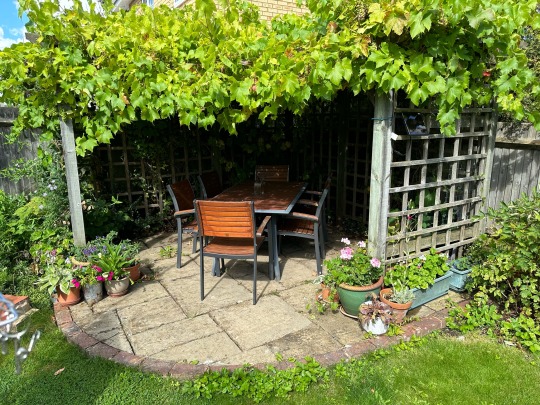
I can’t exactly remember what cultivar it is but I’m fairly sure it’s ‘Regent’, which is a phylloxera and mildew resistant hybrid.
The grapes are good for making wine, which I have done with mixed success, or as eating grapes, but they are a little small and somewhat too seedy for that. They are fairly sweet though.
The entrance to the pergola is south facing so the vine gets a lot of good sunlight through the growing season.
It gets a borderline brutal pruning in late autumn and has, on occasions, made a break for freedom by crossing over the fence at the back of the pergola into my neighbour’s garden.
22 notes
·
View notes
Note
hey!! you follow my plantblr (unexpectedplantblr) and i’ve learned so much just off your tags dude. wdym pruning omg i’m so wildly unprepared how and when should i be doing that! i can’t imagine they have yt videos on shit THAT basic do they!?.
and my apples are dwarfs?? i’ve been stressing abt them so close to the house and was trying to find an arborist to help me move them but do you think they’ll be ok with just some root guard? omg i’m so sorry to bug you feel free to ignore!

There’s no issues and I welcome the asks! This enthusiasm gives me old tumblr days vibes that I think many miss these days lol.
Inevitably most domestic fruiting woody plants need a trim up of pruning for maintenance. Some types don’t need it overall or don’t need it at certain life stages, but those are the lucky cases.
While I’m currently still in the midst of pruning season as of writing this, your photos imply it’s a smidgen late for you to be doing any at all unless it’s either for major issues or dead/diseased wood; it’s generally best to get the pruning before said woody plants leaf out but while they are still dormant to reduce shock, to avoid damaging freshly sprouted growth (since if you’re early enough there’s no leaves to worry about), and keep them wasting energy on wood that’ll be cut off in the process. I recall I got my info on pruning mostly by book literature but I wouldn’t be surprised if there’s some niche videos on the topic online- there are yt video journals and tutorials for niche fruits like Asimina triloba cultivation/maintenance so surely less exotic stuff would have online tutorials on it. Do try to find more than one source to try to average out the answers they give lest they give different answers or overlook different details (gardening can get subjective sometimes after all). If I recall the rule for Grape vines you try to keep one “lead vine” intact to be the one to produce new yearly branches/shoots that will then produce the grapes.
Fortunately I think you don’t have to worry about any issues with skipping the livewood pruning this year; let this year just help you get more familiar with what you’re dealing with.
For next year I can at least say from my own experience a few points; universally you want to prune to remove dead, damaged, and diseased wood, as well as any branches that crisscross with each other (since those will just make damaged wood from rubbing if allowed to stay), and generally you try to not cut more than a 3rd of the live growth (even if it means you gotta wait next year to fully shape a tree if the pruning work for some reason is major- which is my case with my older unkempt trees) to avoid having the pruning reach deadly amounts (there are exceptions- most Clematis are pruned to extreme amounts most of the time, well established Grapes and Kiwis can have a lot taken off too in certain cases). Oh and big one that newbies can miss; if you're getting tools, try to get bypass type pruning tools, anvil type pruning tools do damage to live wood (since they crush moreso to cut unlike bypass) and are better for exclusively dead/removed wood.
Observe what others do to their trees of similar kind to your own; I learned a little bit on what to do with my own apple trees from seeing what other people have done to their apple trees of similar size in my region.
It’s not easy at first but set goals for what you’re pruning. In my case a good chunk of my apple trees are quite old (we’re talking hollowed-out old for many of these trees), so my goal is generally to help extend their lives as well as fruit production as a bonus, so I try to reduce the sources of major weight burden on the large crumbling branches. Another goal in my case is making it that the branches are not as high up so that they are easier to maintain and harvest from, since yet again, my trees are on the larger/older end of what to expect from an orchard.
While not an option for me consulting Arborists is definitely not a bad option if you’re free to throw the cash.
Pruning rules/goals for your dwarf apple trees will probably be slightly different from what I do for my own trees since you’re dealing with very different growth forms from my own.
I am not 100% certain your apple trees by the house are dwarves but their growth habit feels more like what I’d expect/imagine from dwarf/semidwarf trees; as to what fruit variety it could be a lot of possibilities; apple trees tend to be grafted onto rootstock that affects their hardiness/size, so you could have similar cultivars to what I have for the fruit/scionwood but would definitely have very different cultivars for the rootstock that they are attached to. If the previous owners knew what they were doing they would’ve chosen dwarf roostock cultivars to avoid them becoming troublesome so close to the house.
In my opinion dwarves or not they are a bit big already to risk moving/transplanting away from the house without a painful and risky amount of long (worst case possibly years worth) of aftercare; if that is or was truly an issue you’d be better off getting new rootstock to plant in the new locations and grafting onto them from the house specimens onto those new rootstocks (you can hire/ask experts if you can’t quite do it yourself, we had a family member of a family member help save a heritage cultivar in our orchard by getting some successful grafts from the dying tree. I plan to do some grafting myself down the road I just dk what to graft rn). I am not familiar with root guard, from what I read it's a brand of fertilizer that claims to help stimulate root growth???
Also note with the Cherry/Plum trees mention before; one of the issues for ID sometimes for them is there’s just, a lot of species, a lot hybridize together, and that’s not even considering/factoring in domestic hybrids/cultivars where the diversity can be as wide as it is for apple cultivars. It can really muddy the waters for identification down to the exact kind unless you’re dealing with a very sharp specialist or a very distinct variety, and even then some may struggle with certain cases.
Lucky you to also have something as fancy as a finger lime! I already guessed so but that definitely solidified my guess that you are in a warmer growing zone from me lol.
#plantblr#ask#askbox#tried to break it apart to make it easier to read but dear lord that's a lotta text#wall of text
6 notes
·
View notes
Text
True Vine
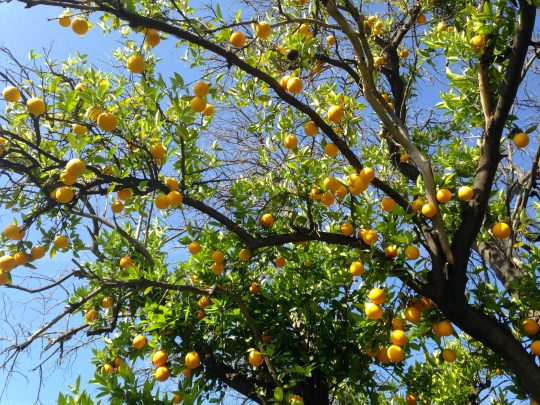
by Andrew Murray
"And Every Branch That Beareth Fruit, He Cleanseth, That it May Bear More Fruit"
– John 15:2
There are two remarkable things about the vine. There is not a plant of which the fruit has so much spirit in it, of which spirit can be so abundantly distilled as the vine. And there is not a plantnwhich so soon runs into wild wood, that hinders its fruit, and therefore needs the most mercilessnpruning. I look out of my window here on large vineyards: the chief care of the vinedresser is then pruning. You may have a trellis vine rooting so deep in good soil that it needs neither digging, nornmanuring, nor watering: pruning it cannot dispense with, if it is to bear good fruit. Some tree needsnoccasional pruning; others bear perfect fruit without any: the vine must have it. And so our Lordntells us, here at the very outset of the parable, that the one work the Father does to the branch thatnbears fruit is: He cleanseth it, that it may bear more fruit.
Consider a moment what this pruning or cleansing is. It is not the removal of weeds or thorns, or anything from without that may hinder the growth. No; it is the cutting off of the long shoots of the previous year, the removal of something that comes from within, that has been produced by the life of the vine itself. It is the removal of something that is a proof of the vigor of its life; the more vigorous the growth has been, the greater the need for the pruning. It is the honest, healthy wood of the vine that has to be cut away. And why? Because it would consume too much of the sap to fill all the long shoots of last year’s growth: the sap must be saved up and used for fruit alone. The branches, sometimes eight and ten feet long, are cut down close to the stem, and nothing is left but just one or two inches of wood, enough to bear the grapes. It is when everything that is not needful for fruit-bearing has been relentlessly cut down, and just as little of the branches as possible has been left, that full, rich fruit may be expected.
What a solemn, precious lesson! It is not to sin only that the cleansing of the Husbandman here refers. It is to our own religious activity, as it is developed in the very act of bearing fruit. It is this that must be cut down and cleansed away. We have, in working for God, to use our natural gifts of wisdom, or eloquence, or influence, or zeal. And yet they are ever in danger of being unduly developed, and then trusted in. And so, after each season of work, God has to bring us to the end of ourselves, to the consciousness of the helplessness and the danger of all that is of man, to feel that we are nothing. All that is to be left of us is just enough to receive the power of the life-giving sap of the Holy Spirit. What is of man must be reduced to its very lowest measure. All that is inconsistent with the most entire devotion to Christ’s service must be removed. The more perfect the cleansing and cutting away of all that is of self, the less of surface over which the Holy Spirit is to be spread, so much the more intense can be the concentration of our whole being, to be entirely at the disposal of the Spirit. This is the true circumcision of the heart, the circumcision of Christ. This is the true crucifixion with Christ, bearing about the dying of the Lord Jesus in the body.
Blessed cleansing, God’s own cleansing! How we may rejoice in the assurance that we shall bring forth more fruit.
O our holy Husbandman, cleanse and cut away all that there is in us that would make a fair show, or could become a source of self-confidence and glorying. Lord, keep us very low, that no flesh may glory in Thy presence. We do trust Thee to do Thy work.
9 notes
·
View notes
Text
The Princes React to MC Being Sick: Rio
second to last of these that i'm planning to do! i've since recovered from the illness that inspired these personally haha. enjoy!
---
“It’s a beautiful day for pruning, isn’t it, Thoma?” Rio called across the field. From beyond the thick hedges of Voleri gold, the valet’s fluffy blond head popped up, grinning in agreement.
“Sure is!”
Rio dusted his hands of stray dirt and leaned back in satisfaction to observe the work he’d done. Rows of perfectly weeded and pruned vines of berries and grapes stretched out before him, gleaming in the midday sun. Nearly perfectly ripe, he thought to himself. There were few kinds of days he enjoyed more than a garden day. Fencing days with Grayson could come close, but of course, Sunbeam didn’t usually join for those, so gardening was decidedly his favorite. Since his paramour had entered his life, everything had felt sweeter: lunch in the refectory, studying in the library, field trips, gardening… it was endless, the list of things she’d made better with her presence.
“Oi! Rio! Keep your head with you, mate! We’ve still got a long way to go!” Thoma shouted, knocking Rio out of his lovesick reverie with a gasp.
“Oh! Sorry!” Rio shouted back, sheepish. Though, as he surveyed the area, it occurred to him that he hadn’t caught a glimpse of his dear paramour for much too long. Had she wandered off to the far ends of the field? The concept of that sent a wave of nerves to his belly. Her special power made her a target, the headmaster had warned him. Suddenly concerned, Rio waved a hand to Thoma. “Just a moment, Thoma. I’m going to find MC!”
Thoma rolled his eyes. “Of course you are,” he replied, laughing, then disappeared back into the curtain of wheat around him.
Rio paced the perimeter of the field, peering between bushes and shrubs and stalks heavy with vegetables and fruit. Her presence was eerily absent. “Hello? Sunbeam?” he called. No response came, until faintly in the distance he caught the faintest sound of a hacking cough. He rushed in the direction of the sound and finally found her, crouched among a cluster of cabbage plants with her face buried in her elbow.
“There you are! I’ve been looking for you! You alright, Sunbeam?” he asked, coming up beside her.
She turned and Rio frowned. Something was clearly wrong. She plastered on a smile and waved at him cheerily. “I-I’m fine! Just been weeding over here-” At that, she turned and coughed again, a wheezing cough that made Rio wince.
“Are you sure you’re okay? You don’t sound good. Are you sure you didn’t inhale any dirt or something?” Rio scooted closer and crouched beside her so he could rub a hand along her back, feeling her shake as her body was wracked with coughs.
“I’m sure,” she choked out. “I’m fine.”
Rio, unconvinced, watched as she restarted her weeding process: her hands looked to be quivering slightly and her movements were slower than usual- in fact, her pile of weeds was quite a bit smaller than it would usually be at this time. Beneath the brim of her sunhat, she looked a bit clammy around the brow.
Frowning, Rio moved to the other side of the row of cabbages and then placed his hands over hers, engulfing the back of her hands in his palms. “If you aren’t feeling good, don’t force yourself to keep going on my account, Sunbeam,” he murmured. When she failed to respond, Rio reached over to tip her chin up toward him, gasping inwardly at the glazed, flushed look across her face. The sunhat had obscured the extent of her illness under its shadow, but with her face now exposed Rio could see the exhaustion and lack of her usual good color and vigor.
“I’m not forcing myself, I’m just a bit ti-ahhh?!” she attempted to respond, but Rio had already stood and scooped her into his arms.
Rio pouted down at her. “You’re not well. I’m going to take you to the infirmary.”
“But-”
“Hey! Thoma! We’re going to go to the infirmary!” Rio shouted across the field, and Thoma popped his head out once again from among the stalks of grain.
“Something happen?!” Thoma shouted back.
“MC is sick!”
Resigning herself to the infirmary visit, she slumped against Rio’s chest as the valet and prince conversed. Soon enough, Rio was striding quickly across the campus in the direction of the main buildings, his face held in an expression of worry. Catching her eye as he walked, Rio jutted out a lower lip. “How long were you feeling poorly?”
Hiding her face in the lapels of his jacket, she sighed. “Just this morning.”
“You felt it before we started gardening?”
She nodded silently. Rio’s grip around her tightened and she could feel him suck in a breath.
“Sunbeam, I… I never want you to do that again. Promise me you won’t?”
Weak to the look of sadness and anxiety in her sweet paramour’s face, she relented with a sigh and nodded again. “I promise.”
Rio nodded back slowly, staring ahead and thinking. “Next time you can just tell me. I’ll never be disappointed if you need to rest,” he said. When the pair reached the infirmary, Rio remained close, sitting on the edge of the bed as the healer administered the potion, silent and deep in thought.
MC threw her legs over the edge of the bed, coughed into her elbow slightly, and then stood, pulling Rio from his thoughts. “I’ll go back to my room now,” she said, looking down at him guiltily. “You can go ahead and go back to gardening with Thoma now- it’ll start to get dark soon and I know there’s still a lot to do. I’m sorry I couldn’t be of more help today.” With that, she began to walk off, but Rio caught her by the arm, reeling her back.
“Wait, hold on, Sunbeam- what are you doing?” he asked, perplexed.
She blinked. “Uh? I was just going to retire now…”
Rio stood, shaking his head firmly. “I’m not going to just abandon you! I’m going to nurse you back to health, of course! I can garden with Thoma later.” With an air of finality, Rio took her by the hand and led her off in the direction of her room, shaking his head and smiling at any protests. Settling her back into her bed, Rio tucked her blankets in tightly around her and gave her a hearty kiss to the forehead. “Wait here,” he instructed, then disappeared from the room.
He returned a short while later with a cart laden heavily with food: different soups, a thermos of tea, a basket of soft breads, a basket of crackers, and a bowl of already peeled and chopped fruits. She noted that his spirits seemed to have lifted in the time he’d been gone, as he sat at her bedside with a thump and an excited grin.
“Luckily the other day Thoma, Tino and I were in the kitchens and so we already had this ready! Here, have some tea first,” Rio said, pouring an aromatic green tea into a cup and then holding it out. “For your throat. And to keep you warm.”
She took it from him and tipped it back- the heat of ginger and the sweetness of honey mixed with sky apples danced on her tongue and left a soothing coating behind. “It feels nice,” she murmured.
Rio nodded enthusiastically, his shoulders releasing tension with no small measure of relief. “Yeah! That tea is one I had as a kid back in Voleri whenever I was ill. I had the kitchen staff teach me how to make it once when Teto was sick and lost his voice.”
“So you’re pretty seasoned at taking care of people, huh?” MC quipped.
“I wouldn’t say that, really. I don’t know it the way people like Toa do, with all their medicines and whatnot. But I know that other things can help. Like this!” At that Rio held up a bowl of soup in one hand- an identical bowl balancing in his other hand.
MC set down the empty teacup and took the proffered bowl, staring down in wonderment at the golden liquid within. “This looks just like…”
Rio beamed. “Yeah! That soup you told me about the other week, what was it… you called it… chicken noodle? Well, I wanted to try making it. I’m not sure we got it exactly right, but you said your mother used to make it for you and so I thought since she can’t anymore, I would.”
She had, while listening, taken several bites of the soup and felt her eyes beginning to burn with tears. She set the spoon down into the bowl with a clatter and sniffled, burying her face in her hands.
“Sunbeam?! Is… did it not turn out right?”
“No! No, i-it’s perfect, Rio,” she choked out. She took in a shaky breath and wiped her eyes. “It’s exactly right. Thank you so much.”
Confused but relieved, he smiled and set his own bowl down on the cart, kicking off his shoes and then climbing over her to sit criss-cross beside her. “I really hope you’ll feel better soon. I don’t like to see you unwell,” he said, leaning over to plant a kiss on her cheek. “Whenever you aren’t feeling good, I want you to tell me. And I’ll make you soup and keep you company every time, I promise!”
Laughing through her tears, she smiled and nodded in assent. “Of course. I promise not to pretend to feel well when I don’t.”
“That’s the spirit!” Rio exclaimed, tugging her into his arms for an enthusiastic hug and she melted into his arms.
“...I love you, Rio. So much,” she mumbled.
He held her face between his hands and smiled gently. “And I love you so much. You should rest now, Sunbeam. And I’ll be here when you wake up.” He brushed a hand down through her hair in long, soothing strokes until her eyelids fell heavy over her eyes and she slipped off into an easy slumber in his arms. Rio leaned back against the pillow and watched through the window as the sun sunk fully out of sight, bathing the room in the final warm orange vestiges of the day. He’d thought to himself earlier that gardening days were his favorite because of her, but it occurred to him now that any day with her was his favorite, no matter what befell them: illness included. Just her presence lit him up inside and made anything wonderful. Basking in the glow, Rio yawned and closed his own eyes, chasing the warmth of his sunbeam into the evening.
29 notes
·
View notes
Text
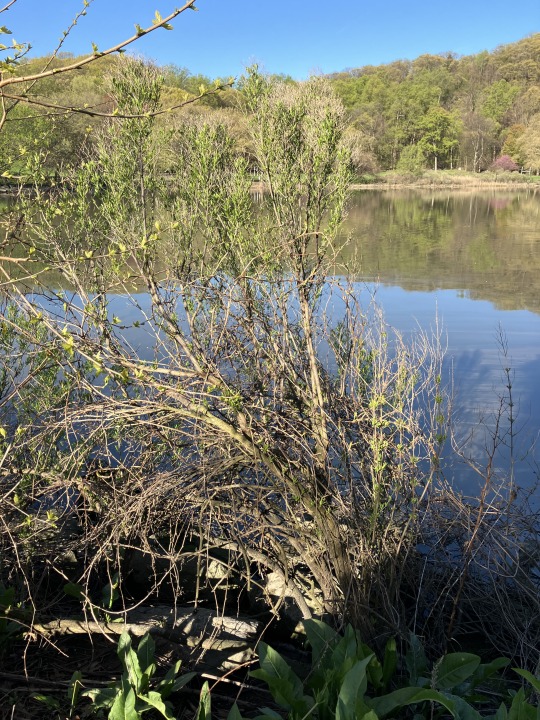
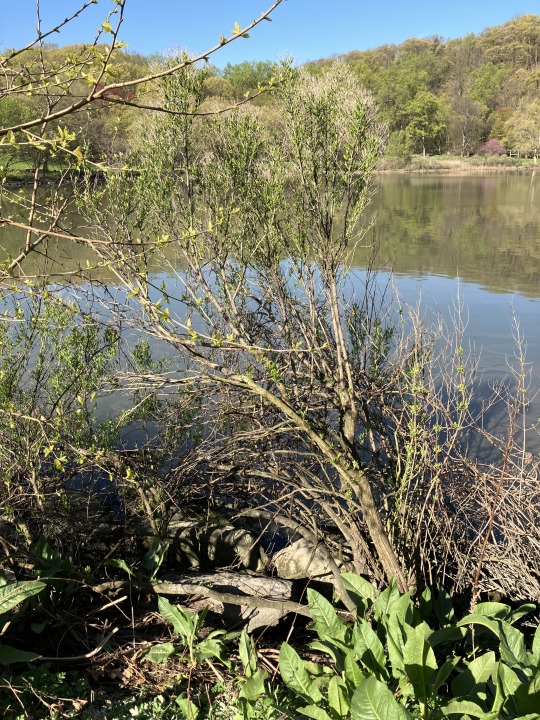
Spent my morning pruning hour at work on this groundsel bush (a native salt marsh species also known as Baccharis halimifolia) that was covered in porcelainberry (Ampelopsis glandulosa var. brevipedunculata), an invasive species of grape. Cherished mutual (of nine years! wow!) @islenskur mentioned not knowing much about the invasive species I work on so here's a little primer for anyone interested.
Porcelainberry is from eastern Asia and was imported to the United States in the late 19th century as an ornamental landscaping plant - it has since gone rogue and is all over the East Coast and has been found as far west as Iowa. The good people of the Lewis Ginter Botanical Garden in Virginia said porcelainberry is "the most pervasive of all invasive plants" they are dealing with. It's a woody vine that can grow as tall as 20 ft, can grow in just about any environment include damp and shaded areas, and has a massive root system so it's also incredibly difficult to eradicate. It grows so quickly and so prolifically that it can easily shade out other plants in the understory and it will also easily cover an entire tree and engulf it -- if you find an undisturbed thicket of porcelainberry, it is probably a monoculture as it has killed or outcompeted everything in the area. Furthermore, since it can regrow from root fragments, it cannot be composted. As high risk of an invasive species as it is, porcelainberry is still sold in the horticulture trade, although it has since been banned in Delaware.
Porcelainberry seeds are spread by birds and small mammals like squirrels that eat the small, marble-like berries that form in the summer; they're actually really beautiful and vary in colour from a robin's egg blue to a deep midnight purple. While they are edible, they taste nasty, so if you like bland berries with a somewhat stinging aftertaste and a slimy texture, these are a perfect snack. The leaves are also edible and not disgusting (I've actually used them to make dolmades aka stuffed grapes leaves and the texture was no different than cultivated grape leaves) and they look quite lovely on a cast iron fence -- zoom in on the little tendrils that it uses to cling to itself and other objects to make a lattice and quickly grow upwards. These tendrils are a big tell for identifying porcelainberry in the winter when there are no leaves, as other clinging/climbing vines like Asian bittersweet, English ivy, and poison ivy have different ways of attaching to the trees.
As much as I hate dealing with it, I have to admit that this plant is incredibly good at thriving in adverse conditions.
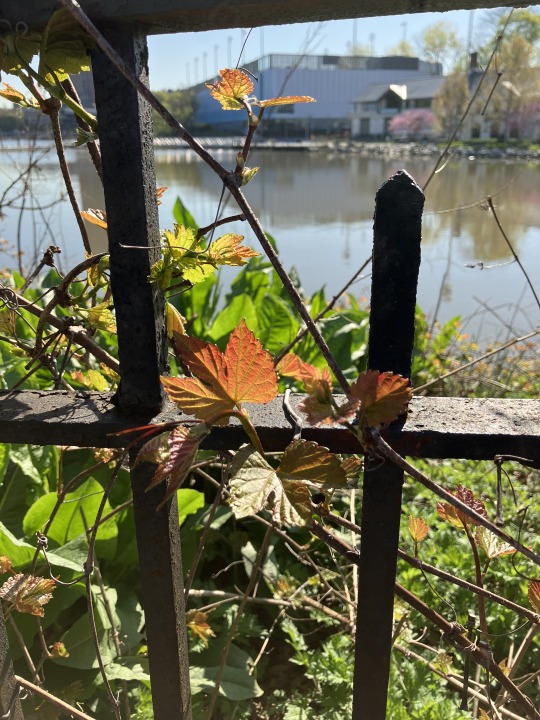

Bonus: it can be hard to see how much is removed just from before-after pictures so here’s the cleanup result:
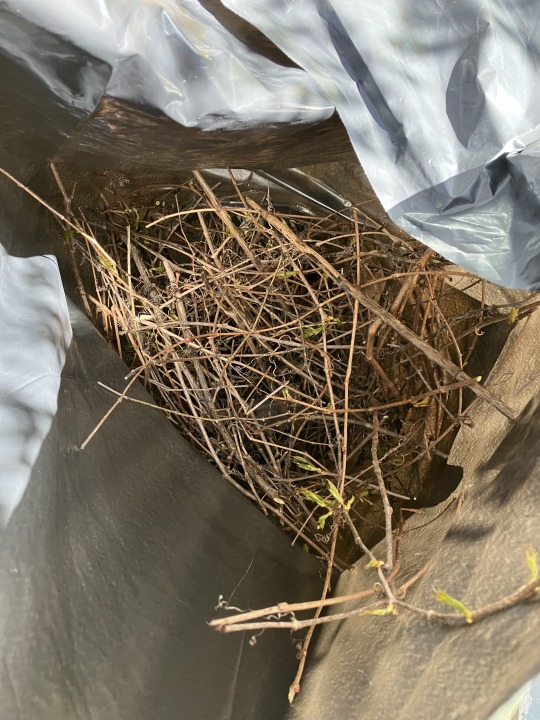
4 notes
·
View notes
Text

8th October >> Mass Readings (USA)
Twenty Seventh Sunday in Ordinary Time, Cycle A
(Liturgical Colour: Green: A (1))
First Reading
Isaiah 5:1–7
The vineyard of the Lord of hosts is the house of Israel.
Let me now sing of my friend,
my friend’s song concerning his vineyard.
My friend had a vineyard
on a fertile hillside;
he spaded it, cleared it of stones,
and planted the choicest vines;
within it he built a watchtower,
and hewed out a wine press.
Then he looked for the crop of grapes,
but what it yielded was wild grapes.
Now, inhabitants of Jerusalem and people of Judah,
judge between me and my vineyard:
What more was there to do for my vineyard
that I had not done?
Why, when I looked for the crop of grapes,
did it bring forth wild grapes?
Now, I will let you know
what I mean to do with my vineyard:
take away its hedge, give it to grazing,
break through its wall, let it be trampled!
Yes, I will make it a ruin:
it shall not be pruned or hoed,
but overgrown with thorns and briers;
I will command the clouds
not to send rain upon it.
The vineyard of the LORD of hosts is the house of Israel,
and the people of Judah are his cherished plant;
he looked for judgment, but see, bloodshed!
for justice, but hark, the outcry!
The Word of the Lord
R/ Thanks be to God.
Responsorial Psalm
Psalm 80:9, 12, 13–14, 15–16, 19–20
R/ The vineyard of the Lord is the house of Israel.
A vine from Egypt you transplanted;
you drove away the nations and planted it.
It put forth its foliage to the Sea,
its shoots as far as the River.
R/ The vineyard of the Lord is the house of Israel.
Why have you broken down its walls,
so that every passer-by plucks its fruit,
the boar from the forest lays it waste,
and the beasts of the field feed upon it?
R/ The vineyard of the Lord is the house of Israel.
Once again, O LORD of hosts,
look down from heaven, and see;
take care of this vine,
and protect what your right hand has planted,
the son of man whom you yourself made strong.
R/ The vineyard of the Lord is the house of Israel.
Then we will no more withdraw from you;
give us new life, and we will call upon your name.
O LORD, God of hosts, restore us;
if your face shine upon us, then we shall be saved.
R/ The vineyard of the Lord is the house of Israel.
Second Reading
Philippians 4:6–9
Do these things, and the God of peace will be with you.
Brothers and sisters: Have no anxiety at all, but in everything, by prayer and petition, with thanksgiving, make your requests known to God. Then the peace of God that surpasses all understanding will guard your hearts and minds in Christ Jesus.
Finally, brothers and sisters, whatever is true, whatever is honorable, whatever is just, whatever is pure, whatever is lovely, whatever is gracious, if there is any excellence and if there is anything worthy of praise, think about these things. Keep on doing what you have learned and received and heard and seen in me. Then the God of peace will be with you.
The Word of the Lord
R/ Thanks be to God.
Gospel Acclamation
cf. John 15:16
Alleluia, alleluia.
I have chosen you from the world, says the Lord,
to go and bear fruit that will remain.
Alleluia, alleluia.
Gospel
Matthew 21:33–43
He will lease his vineyard to other tenants.
Jesus said to the chief priests and the elders of the people: “Hear another parable. There was a landowner who planted a vineyard, put a hedge around it, dug a wine press in it, and built a tower. Then he leased it to tenants and went on a journey. When vintage time drew near, he sent his servants to the tenants to obtain his produce. But the tenants seized the servants and one they beat, another they killed, and a third they stoned. Again he sent other servants, more numerous than the first ones, but they treated them in the same way. Finally, he sent his son to them, thinking, ‘They will respect my son.’ But when the tenants saw the son, they said to one another, ‘This is the heir. Come, let us kill him and acquire his inheritance.’ They seized him, threw him out of the vineyard, and killed him. What will the owner of the vineyard do to those tenants when he comes?” They answered him, “He will put those wretched men to a wretched death and lease his vineyard to other tenants who will give him the produce at the proper times.” Jesus said to them, “Did you never read in the Scriptures:
”The stone that the builders rejected
has become the cornerstone;
by the Lord has this been done,
and it is wonderful in our eyes?
“Therefore, I say to you, the kingdom of God will be taken away from you and given to a people that will produce its fruit.”
The Gospel of the Lord
R/ Praise to you, Lord Jesus Christ.
4 notes
·
View notes
Text
"As for the opposite of dikē, which is hubris, I have already noted that this word is conventionally translated as ‘outrage’. But this translation does not capture adequately the metaphorical world of hubris as the opposite of dikē in the sense of ‘justice’. To understand in more depth the meaning of hubris as the opposite of dikē, I propose to outline the contexts in which we find the word hubris, and I divide these contexts into the realms of (1) humans; (2) animals; and (3) plants.
In the human realm, hubris refers to acts that provoke a sense of moral outrage, which calls for a response by humans and gods alike, and the response can take the form of social and cosmic sanctions respectively; in the Odyssey, for example, hubris refers frequently to the behavior of the suitors of Penelope (i 368 and so on). … As for the realm of animals, hubris refers more simply to any behavior that is violent (Herodotus 1.189) or sexual (as in Pindar Pythian 10.36)—though such behavior extends of course from animals to humans. As for the realm of plants, hubris refers to excessive productivity in one aspect of the plant, to the detriment of other aspects: for example, in the case of fruit-bearing trees and shrubs, hubris would result in the excessive production of wood or of leaves at the expense of the fruit itself.
I turn to a case described by the botanist Theophrastus (fourth / third century BCE). In the passage I am about to quote, Theophrastus is analyzing the behavior of the white lupin plant (Lupinus albus), a kind of shrub that bears a fruit (a kind of “bean”) that is even today commonly eaten as a snack in many parts of the Mediterranean world: The white lupin [shrub] becomes a-karpos [= stops bearing karpos,‘fruit’] when it gets wood-crazy, as it were, and behaves with exuberance [hubris]. Theophrastus About the aetiologies of plants (3.1.5) Or again, in the case of almond trees, soil that is poor in nutrients is better than rich soil for cultivating these trees if the objective is to produce plenty of almonds: For almond trees, poor soil [is preferable], for if the soil is deep and rich, the trees experience an exuberance [hubris] because of all the good nutrition, and they stop bearing fruit [a-karpeîn]. Theophrastus About the aetiologies of plants 2.16.812§14.
To counteract the undergrowth of fruit in plants, the cultivator must prevent the overgrowth of wood or leaves in order to restore equilibrium in growth. So the cultivator must regulate the plant. Theophrastus, in his treatise Research about plants (2.7.7), mentions a wide variety of ways to regulate, including the process of pruning (for example, the pruning of grape vines at 3.15.4); and he notes a traditional way for referring to such a process: you can say that the cultivator ‘punishes the plant that is committing hubris’ (kolazein hōs hubrizon to dendron). … As we saw at the beginning of this hour, a primary metaphor for dikē in the sense of ‘justice’ is a flourishing field or garden or orchard or grove or vineyard or any other such place where vegetation is cultivated. And now we see that hubris, which is the opposite of dikē, is a negative force that counteracts the flourishing of vegetation: hubris results in vegetal overgrowth and undergrowth. From a mythological point of view, the extreme landscapes of hubris are a wildland or a desert."
- The Ancient Greek Hero in 24 Hours by Gregory Nagy
3 notes
·
View notes
Text
felt sooo in my element at work today..pruned apple trees and grape vines and planted onions and just sort of generally started to get the lay of the land.....making a supply needs list tomorrow and will go back friday to start prepping more beds for early spring plantings.....:)
1 note
·
View note
Note
Hi Wo-Chien! Oh goodie you're planning on growing some apples, I know all about apple growing! One thing to know is that any apples that are considered to be a single variety (McIntosh, Ambrosia, Granny Smith, Golden Delicious etc) are actually all clones of each other, meaning that instead of being planted from a seed these trees were planted by cutting a branch of a larger tree and then planting it in the ground so that it's genetically the same as the tree that it was cut from. Since you're growing your apple trees from seeds your apples are going to taste different than the ones from trees the seeds came from, in fact your apples will be unique from any other trees in the world.
Also, do you want to grow them for a high density of apples or for looks as well as a few apples? Because if you want a high volume of apples in a small area you could always try making a “tall spindle” apple orchard, which is where you put wire fences alongside the growing trees and weave them through the fence and prune them to be very thin, so they grow like grape vines and are much smaller but produce as many apples as a large tree does in a smaller area.
But classic apple trees are definitely more recognizable, you just plant the seed in the ground and let it grow into a tree while making sure to keep it pruned so it doesn't grow too tall, or else it won't be able to produce very many apples and will become more like a very large bush.
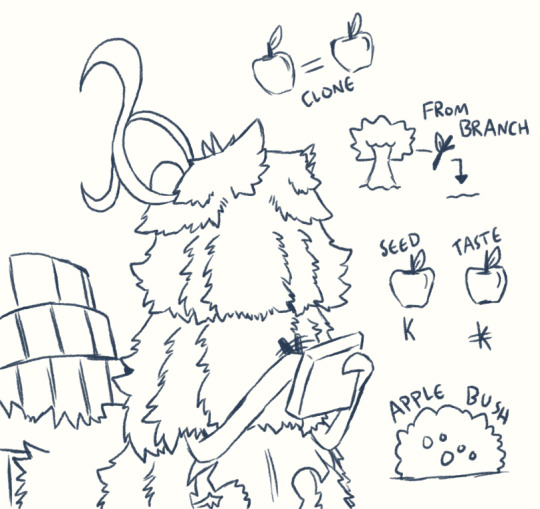
W: (as he eagerly writes down what he hears) "I hope to grow my apples to both make my allotment look nice, and to allow me to make pies and candy apples for visitors. Your advice is very useful, and I'll put it to use when I return to my shrine. Thank you for sharing your knowledge with me!"
#pokemon#pokemon art#pokeask#pokemon scarlet and violet#wo-chien#he'll return to his shrine when he's completely finished what he wants to do in kitakami#alongside helping with the apples wo is also looking to make a home away from home there too
4 notes
·
View notes
Text

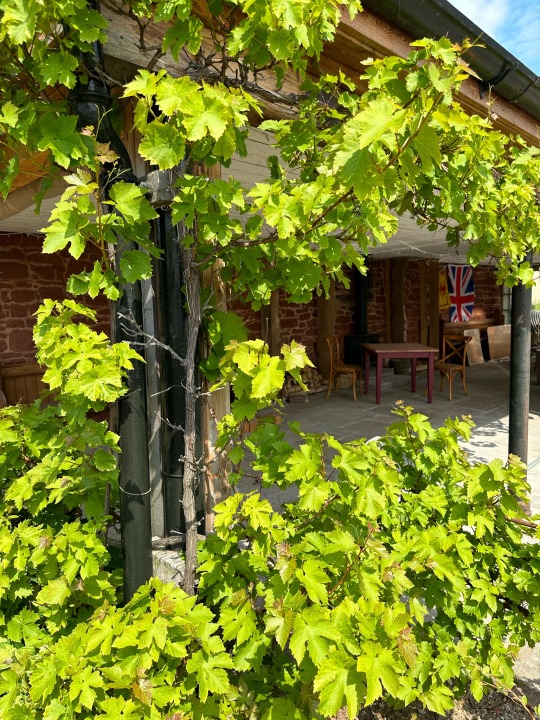

Plant of the Day
Saturday 24 June 2023
This Vitis vinifera (grape vine) makes a great feature along this cafe veranda. This woody plant climbs using tendrils and can be pruned annually to remove side shoots back to the main stem. There are many named cultivars selected for edible fruits or for ornamental leaf shapes and colours.
Jill Raggett
#vitis#grapevine#climber#fruit#edibles#cafedesign#deciduous#plants#horticulture#gardens#garden#GordonCastle#scotland
68 notes
·
View notes
Text
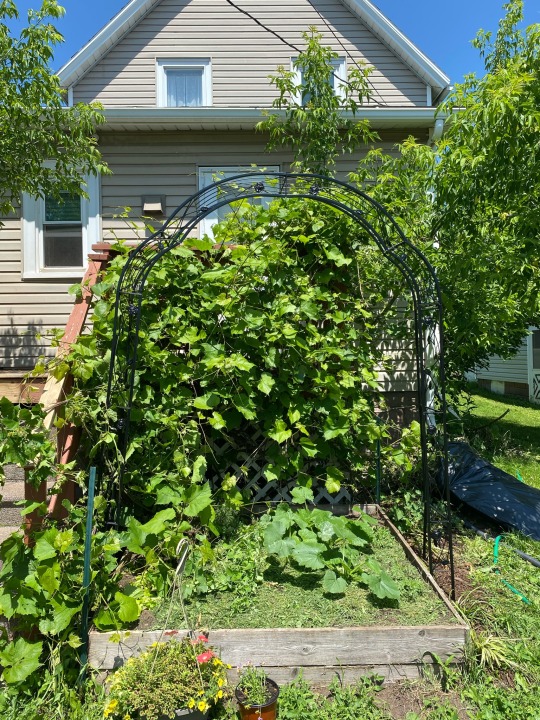
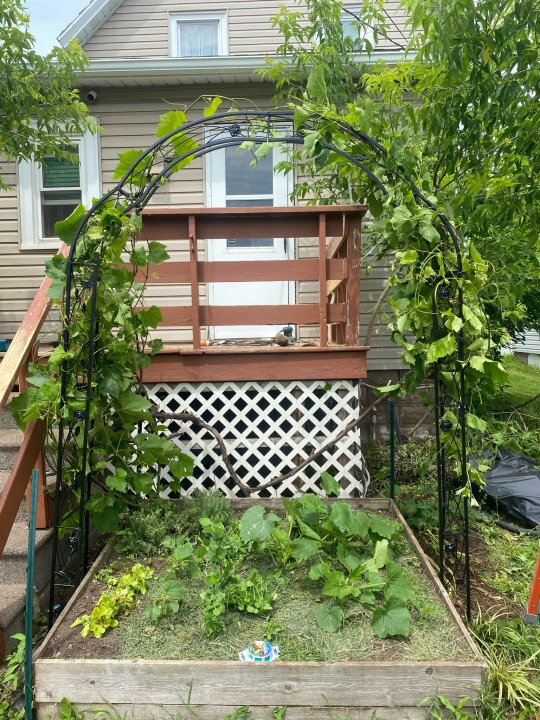
So we have to refinish our deck as the final part of our escrow repairs that need done, which meant tackling The Grape Vine, a massive grape vine that was fully twined around about 3/4 of the deck. I didn’t want to completely get rid of it bc I think it’s very cute and also I love grapes & grape leaves, so I cut it way back and twined it around this arbor instead! Best of both worlds - I get my grapes, and we have use of the full deck now 🤣
I wish I had more before & after pics of the yard, because we’ve done just a MASSIVE amount of work this summer getting it back in shape. Where you can see my little raised garden is now, it was a huge patch of incredibly tall grass & weeds, there was the grape vine situation, back by the garage where the raspberries are was literally just a completely overgrown snarl of spiky branches, the trees had completely taken over the deck as well as parts of the yard, and the front flower bed had become completely covered by grass & weeds. We have pruned, pulled, turned, mulched, and planted so much of this yard! I’m so proud of our progress, and I’m excited to do more landscaping next year now that the yard is back to a manageable condition. Everything (including me) has room to breathe now, and I find it very relaxing to do yard work! I’ll be sure to post more pics once we get the deck refinished, because that’ll be a MAJOR glowup.
9 notes
·
View notes
Photo

Now let me sing to my Well-beloved A song of my Beloved regarding His vineyard: My Well-beloved has a vineyard On a very fruitful hill. He dug it up and cleared out its stones, And planted it with the choicest vine. He built a tower in its midst, And also made a winepress in it; So He expected it to bring forth good grapes, But it brought forth wild grapes. “And now, O inhabitants of Jerusalem and men of Judah, Judge, please, between Me and My vineyard. What more could have been done to My vineyard That I have not done in it? Why then, when I expected it to bring forth good grapes, Did it bring forth wild grapes? And now, please let Me tell you what I will do to My vineyard: I will take away its hedge, and it shall be burned; And break down its wall, and it shall be trampled down. I will lay it waste; It shall not be pruned or dug, But there shall come up briers and thorns. I will also command the clouds That they rain no rain on it.” For the vineyard of the Lord of hosts is the house of Israel, And the men of Judah are His pleasant plant. He looked for justice, but behold, oppression; For righteousness, but behold, a cry for help. Isaiah 5:1-7 NKJV https://bible.com/bible/114/isa.5.1-7.NKJV https://www.instagram.com/p/CiP6eSputlZ/?igshid=NGJjMDIxMWI=
2 notes
·
View notes
Text
A snippet!
A snippet for the newest part of the Xisuma's Server For The Magical, Mystical, & Downright Strange series
Please enjoy
The harvest is an important time of year for many.
Throughout the spring, when the snow begins to melt, farmers sow their seeds. They dig ditches in the dirt before the vernal rains set in and turn the ground muddy. Glaciers lose their winter coat, shedding long sloughs of ice that melt into rivers that flow through irrigation channels.
Farmers tend the crops through the summer. The grape vines are pruned, the leaves sprayed to keep greedy aphids and caterpillars away. Tomatoes and strawberries begin to ripen in the hot sun. The irrigation ditches are still filled with the melting snow, though their waters are lower than they were in the spring.
Fall arrives and the farmers celebrate with great feasts as they shuck corn and pick apples and tear thick stalks off cinnamon plants. The smell of sugar-coated apples in freshly-baked pies, turkey and salmon deboned and cooked to perfection, potatoes covered in chilli powder and butter.
The feasts slow and the final morsels of the harvest are hidden. Peaches in mason jars, locked in a cold cellar to keep them fresh. Corn and wheat is ground into flour and stored away. What remains of the meat is coated in salt and tucked away in a cooler full of brine.
Stress knows this cycle well.
3 notes
·
View notes
Text
Ezekiel 15:2-4 - Jonathan Edwards
Son of man, What is the vine tree more than any tree? Or than a branch which is among the trees of the forest? Shall wood be taken thereof to do any work? Or will men take a pin of it to hang any vessel thereon? Behold, it is cast into the fire for fuel; The fire devoureth both the ends of it, and the midst of it is burnt: Is it meet for any work?
The visible church of God is here compared to the vine tree, as is evident by God's own explanation of the allegory, in verses 6, 7, and 8. "Therefore thus saith the Lord God, As the vine tree among the trees of the forest, which I have given to the fire for fuel, so will I give the inhabitants of Jerusalem," And it may be understood of mankind in general. We find man often in scripture compared to a vine. So in chapter 32 of Deuteronomy, "Their vine is the vine of Sodom, and of the fields of Gomorrah. Their grapes are grapes of gall." And Psalm 53:8. "Thou hast brought a vine out of Egypt;" verse 14. "Look down from heaven, behold, and visit this vine." And Song of Solomon 2:15. "The foxes that spoil the vines; for our vines have tender grapes." Isaiah v. at the beginning, "My beloved hath a vineyard, and he planted it with the choicest vine." Jeremiah 2:2l. "I had planted thee a noble vine." Hosea 10:1. "Israel is an empty vine." So in chapter 15 of John, visible Christians are compared to the branches of a vine.
Man is very fitly represented by the vine. The weakness and dependence of the vine on other things which support it, well represents to us what a poor, feeble, dependent creature man is, and how, if left to himself, he must fall into mischief, and cannot help himself. The visible people of God are fitly compared to a vine, because of the care and cultivation of the husbandman, or vine dresser. The business of husbandmen in the land of Israel was very much in their vineyards, about vines; and the care they exercised to fence them, to defend them, to prune them, to prop them up, and to cultivate them, well represented that merciful care which God exercises towards his visible people; and this latter is often in scripture expressly compared to the former.
In the words now read is represented,
1. How wholly useless and unprofitable, even beyond other trees, a vine is, in case of unfruitfulness: "What is a vine tree more than any tree, or than a branch which is among the trees of the forest?" i.e. if it do not bear fruit. Men make much more of a vine than of other trees; they take great care of it, to wall it in, to dig about it, to prune it, and the like. It is much more highly esteemed than any one of the trees of the forest; they are despised in comparison with it. And if it bear fruit, it is indeed much preferable to other trees; for the fruit of it yields a noble liquor; as it is said in Jotham's parable, Judges 9:13. "And the vine said unto them, Should I leave my wine, which cheereth God and man?"
But if it bear no fruit, it is more unprofitable than the trees of the forest; for the wood of them is good for timber; but the wood of the vine is fit for no work; as in the text, "Shall wood be taken thereof to do any work? Or will men take a pin of it to hang any vessel thereon?"
2. The only thing for which a vine is useful, in case of barrenness, viz. for fuel: "Behold, it is cast into the fire for fuel." It is wholly consumed; no part of it is worth a saving, to make any instrument of it, for any work.
DOCTRINE.
If men bring forth no fruit to God, they are wholly useless, unless in their destruction.
For the proof of this doctrine, I shall show,
1. That it is very evident, that there can be but two ways in which man can be useful, viz. either in acting, or in being acted upon, and disposed of.
2. That man can no otherwise be useful actively than by bringing forth fruit to God.
3. That if he bring not forth fruit to God, there is no other way in which he can be passively useful, but in being destroyed.
4. In that way he may be useful without bearing fruit.
5 notes
·
View notes
Text
Social Climbers
“Nature teaches us that even the most delicate vines can reach great heights with the right support.” Oprah Winfrey
Getting out of my car, the perfume emanating from my garden smells more like being inside the cosmetic department at a store. Flowing over my front gate and arbor, the jasmine is thick in its wondrous white wardrobe. Bees are buzzing as the intoxicating fragrance fills the air. A robust climber, the blooms from this gregarious vine are one of the most sought-after scents to make expensive perfumes and flavored teas. But jasmine has a dark side: it can be invasive. It grows so vigorously that it can strangle trees, shrubs, and flower beds. Wherever a stem touches the ground, a new vine will root. Jasmine thrives in sunlight and the blossoms prefer to face the sun. Keep it pruned and under control, or you may find that it will take over your landscape.
Climbers, vines, or plants that climb have specialized structures that allow them to ascend and cling to surfaces for support. I love many of them and you may also.
What are a few of the most popular climbing plants besides jasmine?
Clematis
Wisteria
Passionflower
Trumpet Vine
Grapevine
Climbing Roses
Nasturtium
ü Clematis is renowned for its beautiful blooms, long-flowering with a plethora of colors, shapes, and climate exposure. There are over 300 species and hundreds of hybrids.
ü Wisteria vines produce romantic cascades of fragrant pendulous blossoms in lavender, pink, and white that resemble bunches of grapes. Their vigorous vining capabilities require a very sturdy structure.
ü Passionflower is delicate and exotic-looking, climbing with tendrils on trellises, encompassing more than 400 species. Heady-perfumed flowers appear on new growth as pollinators flock to the garden.
ü Trumpet vine, native to Eastern North America, boasts trumpet-shaped flowers that attract hummingbirds in glorious shades of red, pink, scarlet, purple, and yellow
ü Climbing Roses can drape over a wall, sprawl along a fence, train up an obelisk, or swirl up a tree. In my yard, my two favorite climbers are the thornless, white Lady Banksia rose which cohabitates with my plum and chestnut trees, and the delightfully fragrant Lady of Shallot in shades of apricot and pink that covers a fence.
ü Nasturtium is a delicious edible plant with a zesty, peppery flavor. Flowers with bold colors of yellow, red, and orange trail and climb.
Popular Climbers NOT to plant:
Honeysuckle
Morning Glory
Ivy
As beautiful as honeysuckle and morning glory are, they can also be incredibly invasive, displacing native species, producing dense mats of foliage, and covering trees, fences, or any item in their path. In some settings, they increase the erosion of the soil while reducing biodiversity. I remember my first visit to Bermuda thirty years ago where I was mesmerized by the giant and glorious sky-blue flowers that covered everything everywhere. When I asked about the “magnificent morning glory”, my comment was met with disdain. “This is a nuisance plant,” I was told. Just as bindweed is a troublemaker in our gardens, controlling morning glory is a challenge. The “easy-to-grow” or “no-fail” honeysuckle called “Hall’s Prolific” is marketed to new gardeners, but these are invasive species. The non-invasive honeysuckle, from the genus Diervilla, is native to North America and an essential part of our ecosystem providing food for native insects. If you want honeysuckle, plant Diervilla. As a self-adherent aerial plant, ivy is an aggressive climber that can wreak havoc on structures, buildings, walls, and trees. Highly flammable ivy harbors rodents and is extremely difficult to eradicate. These three specimens are what I call the “anti-social climbers”. Delete them from your most-wanted list.
Why do you want to include climbing plants in your garden design? The reasons are numerous and desirable.
ü Vertical Interest: Climbing plants allow for more dynamic and layered landscapes as we look up.
ü Climbers can cover arbors, trellises, fences, pergolas, and walls, adding depth and texture.
ü Space Optimization: Climbing plants are space-savers, especially for small gardens or urban settings where space is limited. Because they grow vertically, they make efficient use of space while making a big impact.
ü Privacy and Screening: This may be one of the best reasons for growing climbers. By growing up, they provide a natural privacy barrier, offering seclusion with the added benefit of beauty and most often, fragrance.
ü Aesthetic Appeal: With their beautiful cascading flowers, foliage, or fruit, climbers create a lush and romantic atmosphere.
ü Wildlife Habitat: Biodiversity is established in the garden as most climbers attract birds, butterflies, bees, hummingbirds, and other pollinators. They offer food, shelter, and nesting sites for various creatures which contribute to a healthy ecosystem.
ü Versatility: Vines, creepers, scramblers, and climbers can be trained to grow in diverse directions and on several structures to customize landscapes.
Other than nasturtiums, all the climbers require heavy-duty, solid support structures to grow and flourish successfully. If you want to keep the climbers “social”, it is necessary to prune, maintain, and be watchful, or else they will land in the “anti-social” profile. With careful management and thought, climbers will add beauty, functionality, privacy, and ecological benefits to your garden. Enhance your outdoor space with spectacular social climbers reaching great heights with the right support.
Happy Gardening. Happy Growing!
Read Lamorinda Weekly: https://lamorindaweekly.com/archive/issue1805/Digging-Deep-with-Goddess-Gardener-Cynthia-Brian-Social-Climbers.html
Read Press Pass: https://www.vapresspass.com/2024/04/30/garden-climbers/
For more gardening advice for all seasons, check out Growing with the Goddess Gardenerat https://www.CynthiaBrian.com/books. Raised in the vineyards of Napa County, Cynthia Brian is a New York Times best-selling author, actor, radio personality, speaker, media and writing coach as well as the Founder and Executive Director of Be the Star You Are!® 501 c3 which was just honored as the 2024 Nonprofit of the Year by the Moraga Chamber of Commerce.
Tune into Cynthia’s StarStyle® Radio Broadcast at www.StarStyleRadio.com. Her newest children’s picture book, Books in the Barnyard: Oh Deer!, from the series, Stella Bella’s Barnyard Adventures is available for discounted pre-sales at https://www.CynthiaBrian.com/online-store.
Hire Cynthia for writing projects, garden consults, and inspirational lectures. [email protected]
Share
#socialclimbers#clematis#roses#WISTERIA#SPRING#GARDEN#TOMATOES#cynthiabrian#goddessgarden#diggingdeep#;lamorindaweekly
0 notes